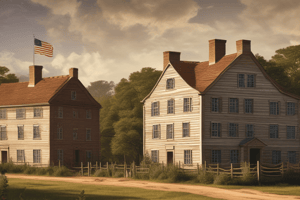Podcast
Questions and Answers
Which colony was heavily influenced by Puritan religious beliefs?
Which colony was heavily influenced by Puritan religious beliefs?
- Massachusetts (correct)
- Virginia
- South Carolina
- New York
What was a key characteristic of the Middle Colonies?
What was a key characteristic of the Middle Colonies?
- Strict Puritan religious codes
- Fishing and shipbuilding as primary industries
- A reliance on slave labor
- Cultural diversity and religious tolerance (correct)
Which significant event was an early form of self-governance created by Pilgrims?
Which significant event was an early form of self-governance created by Pilgrims?
- Jamestown settlement
- The French and Indian War
- The Boston Tea Party
- The Mayflower Compact (correct)
What was a major economic focus of the Southern Colonies?
What was a major economic focus of the Southern Colonies?
Which act contributed to colonial dissatisfaction and was aimed at increasing British taxation?
Which act contributed to colonial dissatisfaction and was aimed at increasing British taxation?
Flashcards are hidden until you start studying
Study Notes
Overview of the 13 Colonies
- The 13 colonies were British territories along the Atlantic coast of North America.
- Established between the early 17th century and the mid-18th century.
- They played a crucial role in the history of the United States.
Division of Colonies
-
New England Colonies
- Massachusetts, Connecticut, Rhode Island, New Hampshire
- Economy based on trade, fishing, and shipbuilding.
- Influenced by Puritan religious beliefs.
-
Middle Colonies
- New York, New Jersey, Pennsylvania, Delaware
- Known for cultural diversity and religious tolerance.
- Economy included farming, commerce, and trade.
-
Southern Colonies
- Maryland, Virginia, North Carolina, South Carolina, Georgia
- Economy heavily reliant on agriculture, particularly tobacco, rice, and indigo.
- Use of slave labor was prevalent.
Key Characteristics
-
Governance
- Each colony had its own form of government, ranging from royal governors to self-governing assemblies.
-
Religion
- Varied by region; Puritanism in New England, Quakerism in Pennsylvania, Anglicanism in the South.
-
Relations with Native Americans
- Initial cooperation often turned into conflict; land disputes were common.
Significant Events
-
Jamestown (1607)
- First permanent English settlement in Virginia.
-
Mayflower Compact (1620)
- Early form of self-governance created by Pilgrims in Massachusetts.
-
The French and Indian War (1754-1763)
- Conflict between British and French forces that impacted colonial relations and led to increased taxation.
Road to Independence
- Colonial dissatisfaction grew due to British taxation and governance (e.g., Stamp Act, Tea Act).
- Key events such as the Boston Tea Party and the First Continental Congress contributed to the push for independence.
Overview of the 13 Colonies
- The 13 colonies were British territories located along the Atlantic coast of North America.
- Established between the early 17th century and the mid-18th century, these colonies were foundational to U.S. history.
Division of Colonies
-
New England Colonies
- Included Massachusetts, Connecticut, Rhode Island, and New Hampshire.
- Economy centered on trade, fishing, and shipbuilding influenced by Puritan beliefs.
-
Middle Colonies
- Comprised New York, New Jersey, Pennsylvania, and Delaware.
- Noted for cultural diversity and religious tolerance; economy thrived on farming, commerce, and trade.
-
Southern Colonies
- Consisted of Maryland, Virginia, North Carolina, South Carolina, and Georgia.
- Economy predominantly agricultural, focusing on cash crops like tobacco, rice, and indigo, supported by slave labor.
Key Characteristics
-
Governance
- Varied governance systems across colonies, including royal governors and self-governing assemblies.
-
Religion
- Religious practices differed by region: Puritanism prevailed in New England, Quakerism in Pennsylvania, and Anglicanism in the South.
-
Relations with Native Americans
- Initial cooperation with Native Americans gradually turned into conflict, with frequent land disputes.
Significant Events
-
Jamestown (1607)
- Marked as the first permanent English settlement in Virginia.
-
Mayflower Compact (1620)
- Represented an early form of self-governance established by Pilgrims in Massachusetts.
-
The French and Indian War (1754-1763)
- A conflict between British and French forces that affected colonial relations and led to heightened British taxation.
Road to Independence
- Rising colonial discontent due to British taxation policies, including the Stamp Act and Tea Act, sparked resistance.
- Events such as the Boston Tea Party and the First Continental Congress were pivotal in rallying support for independence.
Studying That Suits You
Use AI to generate personalized quizzes and flashcards to suit your learning preferences.




